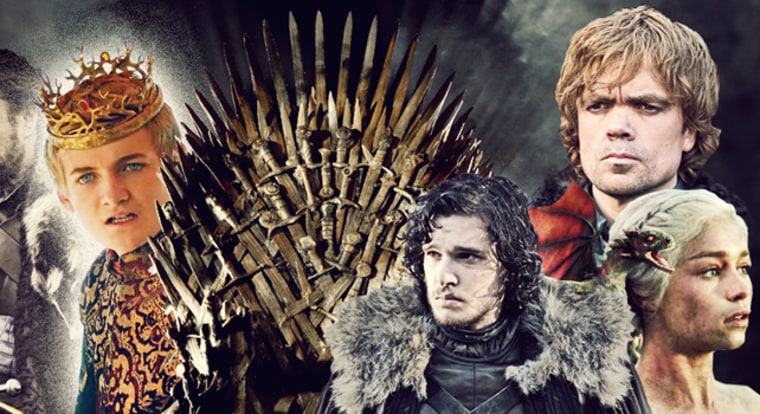Recently, with a tone of barely concealed glee, Forbes declared that HBO’s "Game of Thrones" was on its way to becoming the most pirated show of 2012.
Piracy of premium cable shows has received more attention from bloggers since an amusing Oatmeal comic pointed out how hard they were to download legally earlier this year. Since HBO won’t make its shows available promptly on Netflix or Hulu, some argue, the channel is practically forcing fans to pirate its shows. As Forbes pointed out, "for the millions of Americans who don’t subscribe to HBO, or who may not even watch shows on a television, this means there is no legal way to watch Game of Thrones."
It’s a similar position to one taken by Reddit founder Alexis Ohanian recently. "I love paying for stuff," he insisted at Fast Company’s Innovation Uncensored event. Ohanian said he couldn’t get the show on the cable network's iPad app, HBO Go, because he’s not a cable subscriber. "There are so many people looking for an excuse to give money to support art in all of its forms," he said. "We as innovators need to do a better job price discriminating and making sure they can get access to whatever level they want to pay for it."
On the most basic level, Forbes and Ohanian are right: HBO’s decision to restrict the availability of "Game of Thrones" is one reason why it gets pirated so much. But the restriction gives HBO a business — and the wherewhithal to make shows like "Game of Thrones" in the first place. There’s a reason there’s nothing that good on network television.
Related:
No one likes paying for cable. But the rise of the pay-TV business model led to the revolution in quality we’re currently enjoying from HBO shows like "Thrones," as well as basic-cable programs like "Mad Men" and "Breaking Bad."
Years ago, when channels only received revenue from advertising, they made shows to reach as many people as possible, whether viewers loved them or just tuned in because they happened to be on. Cable changed those incentives, rewarding the creation of shows viewers felt strongly enough to pay for (indirectly in the case of channels like FX and AMC). That made nuanced drama profitable on television — and the best television more sophisticated than film. Sometimes, you really do get what you pay for.
No one likes paying for cable. But the rise of the pay-TV business model led to the revolution in quality we’re currently enjoying from HBO shows like "Thrones." Shows like "Game of Thrones" cost big bucks. Each episode of the first season reportedly had a budget of more than $5 million.
Most such shows don’t attract all that many viewers compared to cheaper mainstream programs like "American Idol." And if "Game of Thrones" sounds like easy money, remember that it has to generate enough profit to make up for "Rome and John From Cincinnati." If HBO sold every show by the episode right away, it would have to charge a premium for hits to make up for its inevitable misses.
There are those who argue that the future lies in cheaper content, available simultaneously on a variety of platforms. This doesn’t work so well in the present. Big-budget shows have better odds of capturing an audience, and they’ll inevitably make less money on advertising as more consumers watch them on DVRs. One shudders to think about product placement opportunities for a show like "Thrones."
Related:
The idea that HBO’s exclusivity amounts to an outrage seems silly, since it essentially amounts to commerce: If you want it, you have to pay for it. Obviously, HBO sets its own terms — it sells content by the month, not the episode — but so does every other company, in some way.
Beer isn’t sold in five-packs. And, of course, "Thrones" is available on iTunes a year after it airs. (I waited to buy it and I’ve managed to lead a fulfilling life.) As the online kids say, call the Waambulance!
Piracy certainly threatens HBO, to the extent that it offers consumers a way to cancel their subscriptions. But the greater threat is that executives would listen to advice from bloggers and make "Thrones" immediately available on iTunes. The $30 or $35 HBO would get for an entire season of the show just wouldn’t add up to much compared to the $15 or so per month it gets from subscribers. As Forbes says, HBO is certainly "missing out on a huge potential audience." But so is Mercedes-Benz, and no one suggests it should start making Hyundais.
More from Fast Company:
- Steve Jobs almost named the iMac The MacMan, until this guy stopped him
- In 8 years, Facebook changed all we do online
- Inside Google X's Project Glass, Part I
Robert Levine is the author of which Businessweek found "timely and impressive" and the New York Times Book Review called "a book that should change the debate about the future of culture." He has been the executive editor of Billboard and a features editor at Wired and New York, and he has contributed to Vanity Fair, Rolling Stone, and the New York Times. He attended Brandeis and Northwestern University’s Medill School of Journalism. He covers the culture business from New York and Berlin. Follow on Twitter.
